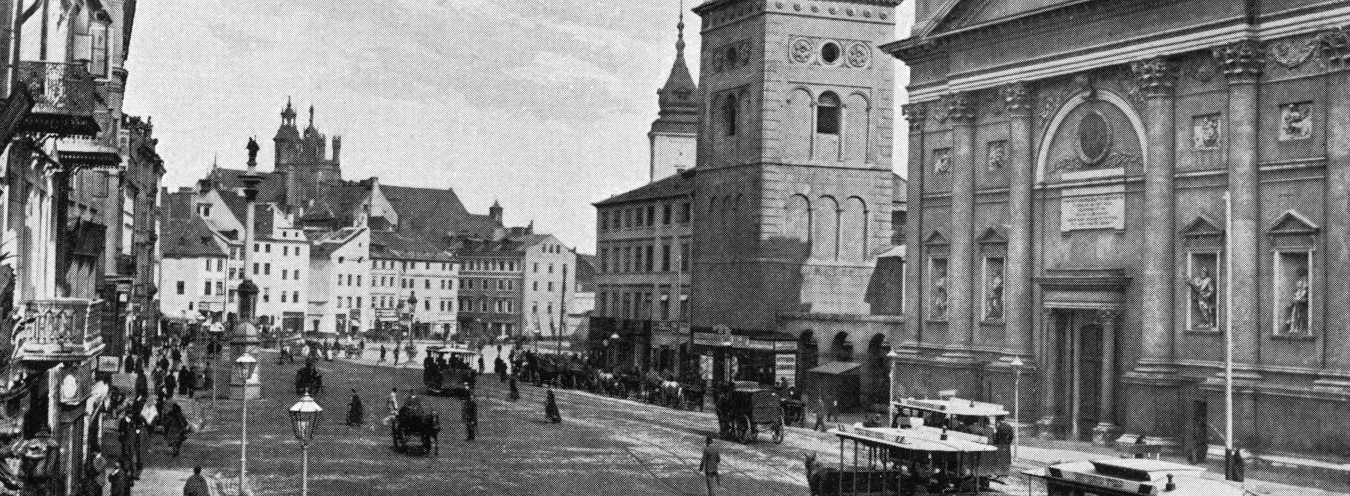
Rzecki, Ignacy
[Figure courtesy of Warsaw Public Library – Central Library of the Masovian Province]
Ignacy Rzecki is a major figure in The Doll, primarily due to his function as a narrator. His Journal of the Old Clerk takes up nine out of twenty-eight chapters of the entire novel. He is the second protagonist next to Stanisław Wokulski. Prus constructs this character with sympathy, and encourages the reader to a similar attitude. Among different characters in The Doll, he is represented as the last romantic, visibly belated in the period he lives in. The author dates his childhood and youth between the November and January Risings (1830–63), but the last fifteen years in the old clerk’s life are lived in a completely different epoch.
The plot of The Doll takes place in less than two years between March 1878 and October 1979. At the time, Ignacy Rzecki is an eccentric bachelor, whose opinions, clothes, and lifestyle do not fit the new times. He exhibits naiveté in his judgment of both people and events. Rzecki diligently records current events from newspapers in his journal, but he keeps looking among them for evidence that the new Napoleon will appear on the international scene and will introduce peace and justice in Europe. At the same time, this eccentric loner, for a number of years, has been successfully running a business, the shop in Krakowskie Przedmieście.
He was employed by Jan Mincel’s company and later by Jan Mincel and Stanisław Wokulski’s company for forty years, first as an apprentice (1840–1846) and then as a clerk (1846–1848). Finally, after his four-year break (1848–1853), he returns to work as a clerk again in the new shop on Krakowskie Przedmieście. His close connection to the company is visible in his living arrangements. He has always lived next to the shop: first he boarded with Jan Mincel, and then he had a studio flat divided from the shop only with a hallway. When the shop is moved, Rzecki again occupies a flat next door. Significantly, in his later years, he can afford to live more comfortably, but he does not seem to care about it. The only luxury that he decides on are dinners brought from a restaurant by a shop assistant.
In the old clerk’s journal, Prus shows the development of a small family company into a large prosperous shop from the perspective of Rzecki. Rzecki is critical of changes, and he misses the old shop in which he worked a youth. He notices difficulties stemming from the management of the increasingly larger staff and the growing numbers of suppliers and customers. Formally, Rzecki continued to work as a clerk, but because the owner Jan Mincel, Jr. was ill for many years and died in 1871, he was, in fact, the one who ran the entire business. When Stanisław Wokulski inherited the company, Rzecki officially became his plenipotentiary. He resigned only when the shop was bought by Henryk Szlangbaum. In Prus’s vision, Rzecki embodied the key virtues of a merchant: reliability, conscientiousness, and professional ambition.
Yet he is not a one-dimensional character. The author depicts Rzecki as a patriot who not only placed his hopes for a radical change in the Bonaparte family but also decided to take part in the struggle “for your freedom and ours” in the Hungarian Revolution in 1849, where he received an officer’s commission and was twice wounded. When he came back to Congress Poland, he spent two years in a Russian prison in Zamość (1851–1853). He also took part in patriotic conspiracies before the January Rising, though there is no information in the novel suggesting that he took part in the Rising itself. Instead there are many memories about the victorious combat in Hungary. All the old clerk wanted was to die beautifully in the next Springtime of Nations.
In the novel, his relationship with Stanisław Wokulski is of special significance. Wokulski was his only friend, and Rzecki was completely devoted to his trade company; he cared for him deeply and firmly believed that Wokulski was engaged in secret political and patriotic activity.
Objectively, it seems that Rzecki is successful in his life. He was born in a very poor family: his father was a janitor, and his aunt a washerwoman. He barely had any education; his father taught him how to read and write, and then he trained as a merchant in Mincel’s shop. Nevertheless, he would constantly read newspapers: he followed current political events and read History of the Consulate and Empire. His everyday life was monotonous: he spent full days in the shop, and felt ill at ease at dinner-parties or in the theatre. Despite his steady financial situation, he never got married. For amusement, he played the guitar for his old dog Ir or tried to sing. He did not have any relatives, and his social life was limited to an occasional meeting at a bar with his friends.
→ Ir and Other Animals; → Napoleon Bonaparte; → January Rising; → Hungarian Revolution of 1848;



